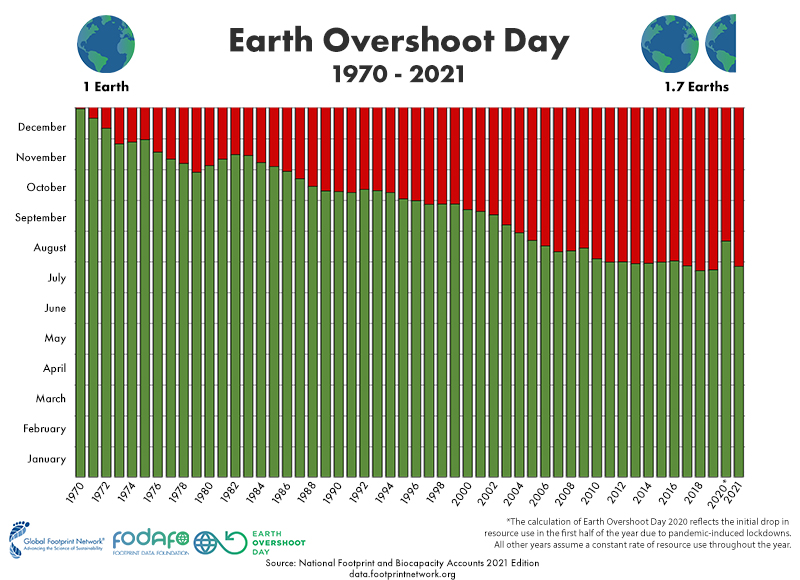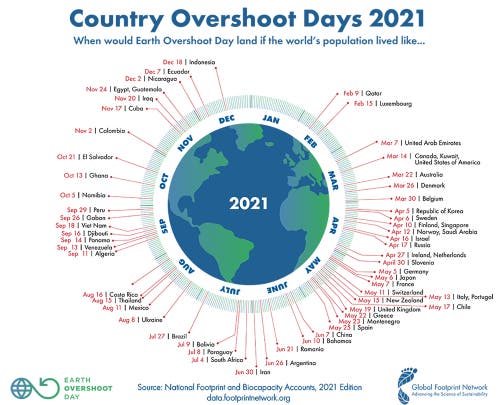
While the video pointed out that earlier recessions had reduced humanity's ecological footprint before, the results has usually delayed Earth Overshoot Day by days, not weeks, if at all, and can be short-lived. The record of past Earth Overshoot Days shows that the Great Recession of 2007-2009 merely stalled the date at August 14th in 2008 and pushed it back 4 days to August 18th in 2009. In 2010, it advanced 11 days to August 7th. The 2001 recession merely slowed down the trend, with the date moving back 1 day from September 22nd to September 23rd. Before that, the Gulf War recession of 1991-1992 held the date at October 12th during 1992-1993. The longest lasting effect was from the double-dip recession (Reagan Recession) of 1980-1982, when it took 5 years for the date to return to November 4th. As for this year, it's the latest date for Earth Overshoot Day since 2005, when it fell on August 25th. I don't expect it will be this late next year.It wasn't. Global Footprint Network announced this year's date in Earth Overshoot Day 2021 lands on...
Earth Overshoot Day 2021 lands on July 29, Councillor Susan Aitken, the Leader of Glasgow City Council, announced today on behalf of Global Footprint Network and the Scottish Environment Protection Agency (SEPA).Based on previous announcements, today would have tied with 2019 for the earliest Earth Overshoot Day. However, the Global Footprint Network recalculated when previous Earth Overshoot Days actually occurred, so 2017's date was moved up from August 2 to July 30, 2018's shifted from August 1 to July 25, and 2019's advanced from July 29 to July 26, so today is only the third earliest. That's not how I want to "move the date." This year's date moving up more than three weeks also fits the pattern I described last year of relatively rapid recovery of resource use and waste production after recessions. This is one of those times I wish I weren't right.
Now This Earth explains how the Global Footprint Network determined this year's date in Researchers Mark This Year’s ‘Earth Overshoot Day’ as July 29.
We’ll have already used up all the resources Earth can naturally reproduce for this year by July 29, researchers say.That's a great explanation with a lot of information that I could react to, but I'm confining myself to just three points. First, I'm with Laurel Hanscom that humanity should strive to move the date through choice and design, not by disaster and tragedy. That's part of what makes me a Crazy Eddie. Second, as host Alejandro Alba pointed out, every country has its own overshoot day. He mentioned that the U.S. already passed its overshoot day on March 14, while Indonesia won't reach its overshoot day until December 18. Here's a graphic showing the overshoot days for the rest of the world's countries.
...
Every year, researchers calculate the date by which we will use up all the resources the planet is capable of naturally renewing over the entire year. This year's Earth Overshoot Day falls on July 29. That means that 210 days into 2021, we’ll be living on credit or digging into our savings to live and survive on Earth.
Earth Overshoot Day was created by the Global Footprint Network, and it’s determined by measuring biocapacity, the biological capacity of the planet to regenerate natural resources and absorb waste materials.

According to this chart, the U.S. isn't the least sustainable. Qatar is with an overshoot day of February 9 this year. Still, that's nothing to celebrate.
Finally, people have to work to move the date by reducing their resource use and waste production. I check my progress by calculating my footprint on this date. Three years ago, it was 3.8. Two years ago, it was 3.5. Last year, it was 2.8. This year, my footprint followed the global trend and returned to 3.5 and a personal overshoot day of April 14. Well, at least I'm still a month later than the average American, but I no longer have the same or smaller footprint as the average German, which fell from 3.2 to 2.9. I'm keeping that goal for next year.
Today is another environmental day that doesn't move around the calendar, so follow over the jump to celebrate it.

Yes, today is International Tiger Day. Take it away National Day Calendar!
International Tiger Day on July 29th raises awareness about the dwindling numbers of the biggest of the big cats. Global leaders focus on the tiger during meetings designed to promote a system for protecting and enhancing their natural habitat.I missed International Tiger Day twice and both times promised to celebrate it on time. Third time's the charm!
A hundred years ago,100,000 tigers roamed Asia. Today, the estimated number brings the tiger population to fewer than 4,000 tigers in the wild. One of the goals of the day is to double that number by 2022. It’s called the Tx2 Initiative.
The Tx2 Initiative collects about $350 million every year to help save tigers. The money is spent on investigators and rangers who patrol for poachers. The fund also pays for protection of tiger habitat, studies of their populations and movements, and even sets up thousands of wildlife trail cameras.
...
International Tiger Day was created in 2010 at the Saint Petersburg Tiger Summit.
No comments:
Post a Comment